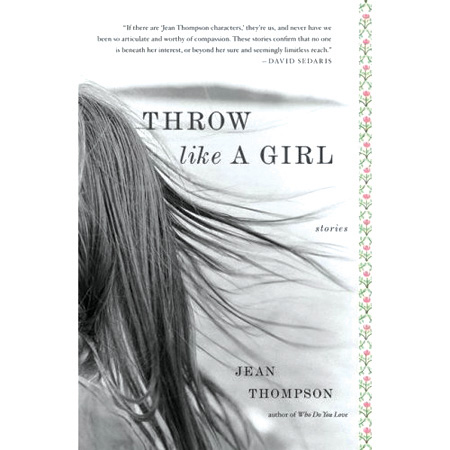“It seemed you ought to be able to aim desire like a lens, and pass your longing straight through it. Maybe I was simply out of range.”

Jean Thompson’s Throw Like a Girl is an occasionally illuminating collection of short stories about women who inhabit what we call the “middle class,” that fictitious category invented to reassure Americans that there is no economic inequality in the United States. If we all try just hard enough, we’re told, we could land somewhere solidly in the “middle” and live happily normal and humdrum lives.
Thompson’s women live in the middle of middling lives: they are neither coming nor going; they live in the middle of the country; they live in the middle of life itself. They are caught in the process of daring themselves to leap one way or the other. Jessie in “The Five Senses” is between her comfortably middle-class parents and the wild boy who promises her freedom. In “It Would Not Make Me Tremble to See Ten Thousand Fall,” Kelly Ann is between her high school graduation and life as a pregnant and married teen. In “The Woman Taken in Adultery,” the married protagonist finds herself literally between her husband and her lover.
Thompson digs deep into quotidian details and the results are sometimes effective and surprising, but too often bound up in inevitability. She’s best when she lets her characters function as if they had inner lives of their own, rather than forcing them to work inexorably towards the endings she has devised for them. The finest and wittiest story is “The Inside Passage,” about an unnamed woman who has been unhappy in an involvement with a married man and is now in Alaska on a series of boat trips because “I had the luxury of going somewhere exotic to be miserable.” At every stop, she calls her lover from pay phones under a different assumed name, hoping to talk to him one last time. The story’s delightful unpredictability is matched by the woman’s engaging cluelessness about everything, even the possibility of a bear attack: “It would eat me up while I was still thinking none of this was happening.” Yet it’s she who precisely and wryly summarizes the nature of longing: “It seemed you ought to be able to aim desire like a lens, and pass your longing straight through it. Maybe I was simply out of range.”
But for the most part, the trouble with Thompson’s characters is that it’s difficult to imagine they could survive outside the stories. Reading Throw Like a Girl is like being led through a series of doll’s houses with all the little people manipulated and arranged precisely, caught in mid-sip during a tea party or on the way to bed. They are all compelled to move towards an upper-case Fate, and it’s difficult to empathize with many of them. In a collection of stories about women, it seems more than a pity to not allow them this much—the freedom to lead messy lives, the freedom to become utterly lost.
This kind of overdetermination is especially evident in the dialogue, which often snaps and crackles too much, like sitcom banter. In “Holy Week,” Olivia confronts Bruno, who wants to take her daughter away to Europe, “For money, Mamma give permission?” Comes the response, “For free, Mamma break your face.” It’s too funny ha-ha, like something that should be accompanied by a laugh track.
Endings can be similarly overdone. The finely tuned “Hunger” is about a woman who melts and oozes into dementia as her family mops up the mess around her and it ends on a surprising note that matches the quietly understated narrative thrust of the story. The same cannot be said about “The Five Senses,” which works too hard to shock and jolt at the end. The best fiction takes one by surprise, not shock; the latter, unless rendered with skill, is a pale substitute for the former. Thompson would have done well to remember the distinction more often.